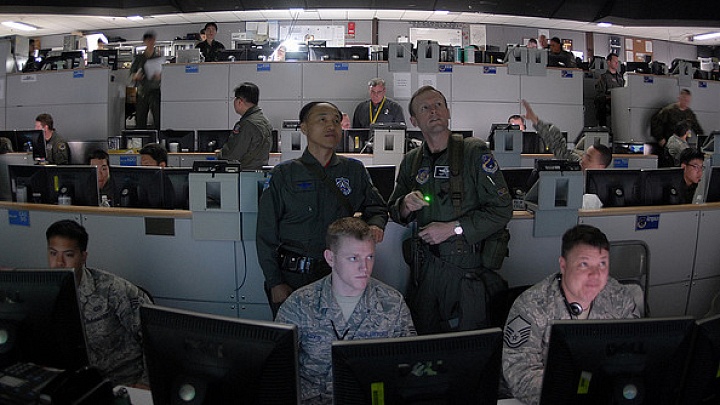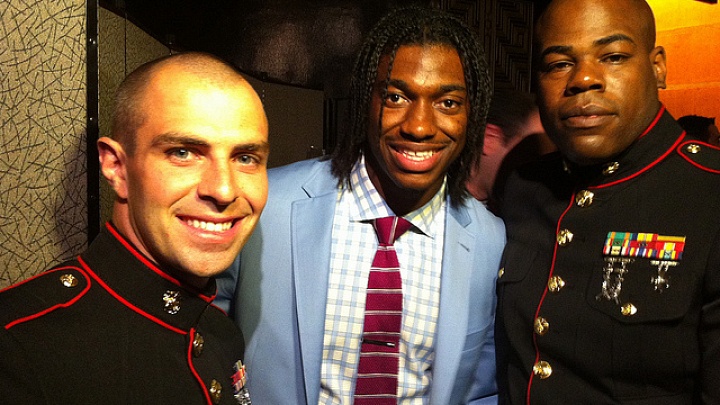There are many theories put forward as to the goals, intentions, and motivations of Vladimir Putin, yet he remains a mystery to most. The response of Western governments to his machinations in Ukraine and the false predictions that Russia should have backed down by now show a misunderstanding of his intent and underestimation of his will. Growing up in the former Czechoslovakia before immigrating to America, I lived in a country under Soviet dominance for 20 years during the Cold War. This period in Russian history is clearly an era Putin wishes to return to. The Obama administration talks of a “reset” in U.S.-Russia relations; Putin wants to reset it to the Cold War. I believe that those of us like me who lived behind the “Iron Curtain” have insight into who the Russian president is. He is less of a mystery to me.
Calculation, not Russian Roulette
Putin is a huge part of Europe’s future, an active, driving force behind much of what happens there. Unlike the West European states which today take a more passive approach to world events and prefer to let the EU and international institutions they have developed shape events, Putin takes a much more active role in shaping events that affect Russia. He is willing to use economic coercion in the form of “energy politics, military means, such as provocative displays of force and asymmetric warfare, and information warfare that uses the media to befuddle Western understanding of his actions. These are the concerted actions of a man who has a strategy and clear purpose in mind, not someone who is making it up as he goes along.
Putin is not an all-out charging conqueror; excessive risk does not suit him. He is a calculating planner and an opportunist who works patiently to craft perfect conditions and then acts when the time is right. The invasion and annexation of the Crimean peninsula was not a spur of the moment decision, but a well-developed plan. The timing of the invasion is particularly instructive. Following the feelings of international goodwill that accompanied the 2014 Sochi Winter Olympics – an event that went much better than predicted – no one expected such an action. The annexation caught the West wholly flatfooted and unable to respond. It stood by as Putin’s “little green men” invaded another sovereign country under only the thinnest veneer of deniability. The Olympics served as a strategic diversion for an invasion worthy of a Soviet-era operation.
Putin is not an all-out charging conqueror. Excessive risk does not suit him. He is a calculating planner and an opportunist who works patiently to craft perfect conditions and then acts when the time is right.
An additional dimension to Putin’s strategy is to portray an image of strength to both his own people and the West. He has successfully cultivated his appearance as a tough man for a long time. Think of the pictures of Putin donning military attire and combat boots, wielding a hunting rifle in the wilderness bare-chested, swimming with strenuous butterfly strokes in cold water, and so forth. All of this conduct was certainly meant to impress Russians and intimidate foreigners. He wants foreign leaders to recognize how inadequate they are in comparison to him, and that he is nothing like them. He wants to portray himself as physically strong in contrast to Western politicians who appear not only physically weak, but appear weak in resolve the longer they fail to challenge him, even when it is apparent he is not being an honest broker.
Putinology
As a noted psychiatrist Dr. Keith Ablow assessed:
“Vladimir Putin is no psychological mystery. While I have certainly not treated Mr. Putin, his actions on the world stage tell me that he believes that those with power should use it and that those who are reticent to use it are no different from those who are inherently weak. What is more, it appears to me that he believes weak individuals and peoples and nations are placed in his path specifically to yield to him and to Russia—which are for him, very nearly one thing.”
Putin’s actions display a narcissism that is a defense mechanism resulting from traumatic events which is designed to protect him against feelings of inferiority. Though stories of Putin’s early life are spotty and conflicting, it is clear that he grew up in desperately poor circumstances in Leningrad, a city that was nearly destroyed by the Nazi siege eight years before his birth. The picture is one of a boy placed in a situation in which he had to fight or fly—and Putin fought. To protect his psyche from feelings of inferiority, his belief in himself grew to out-sized proportions to compensate. His early KGB file recordshim as having “a reduced sense of danger.”
Part of this narcissism is a hatred of feelings of “losing” or humiliation and contempt for others seen as inferior or weak. Picture him, a KGB officer serving in Dresden, burning files as rioters attempted to break into the Soviet embassy and desperately calling Moscow for further instructions that never came. For Putin and many other Russians, there was no final battle or reckoning with the West. They simply watched as the government in Moscow collapsed. Putin and many of his countrymen do not feel they “lost” the Cold War—rather they feel they simply forfeited.
Cold War humiliation explains the contempt Putin holds for the West. His bald-faced denials of indisputable facts, which he frequently makes to Western media reports on events in Ukraine and elsewhere, show how little respect he has for the opinion or perhaps even the intelligence of those making the assertions – assertions by his inferiors merit no serious response.
Putin considers himself and the Russian Federation one entity – a Russian version of LÉtat, cest moi. His inner circle and devotees to his United Russia Party see him as such as well. His popularity has soared since the annexation of Crimea. With such belief he assumes to be the warden of all Russian history, conquests and losses, a tsar as transformative as Peter the Great. He connects himself to the great men of Russian history and has revived the Russian Orthodox Church – which is returning the favor by elevating his reputation. He feels righteous in his endeavors as he envisions his own benefit to be equally beneficial to Russia. It is exhilarating for him to see the West floundering to respond to his well-laid plans.
Some have suggested that Putin is not a rational actor, or that he is a socio- or psychopath even. This is not true. Putin may be a narcissist, but he is not crazy. He is far from it, though the suggestions sure add to the question marks that surround him.
A 2008 report prepared for the US military’s Office of Net Assessment found Putin may have Asperger Syndrome. He appears uncomfortable and acts awkwardly in larger groups. Note the eyes rolling left and right, tight lips, and chin pressed to the chest to perhaps subconsciously protect the neck, as if ready for “fight or flight” at any instant. However, those who have Asperger’s find it difficult or impossible to understand or engage with the emotions of others. While at times Putin does seem wholly unable to consider the “feelings” of his Western counterparts, this is a decision to ignore them out of contempt, not a symptom of some disorder. He has deftly manipulated domestic Russian political opinion and “feelings”– though some of this has come at the end of police batons and through showing little mercy to those who oppose him. His strategic calculations show that he certainly has considered and engaged with the likely emotional response of Western leaders to his actions.
Vladimir Putin is less of a mystery than he is often portrayed. His conduct is what would have been typical of a Soviet leader behind the Iron Curtain. A bigger mystery is why the Western response has been so weak and feckless, despite the clear signals of Putin’s views, intent, and strategy. Rather than suggest Putin suffers from a disorder that alters his perception of the world around him, it is perhaps Western leaders who are suffering from a disorder of wishful thinking that prevents them from understanding Putin.
[Photo: Flickr CC: Jedimentat44]
Ike Cagan was born in the former Czechoslovakia where he was active in the struggle against the occupation of Warsaw Pact countries. In the U.S. since 1968, he attended Temple and Drexel Universities and has an MS in Engineering. He is President of Automated Sonix Corporation, a sonar maker. He lives in Boca Grande, Florida with his wife and son.



Hi Ike;
I enjoyed reading your article about Russia and Putin; We share some common background, I was born in Prague, Czechoslovakia in 1950s, grew up there and came to US in 1980s; Your assessment is correct and I opine that Russia is unpredictable and willing to risk eventually anything, including open armed conflict, to re-establish its sphere of influence in order to compensate for its own inner lack of overall quality and ability to practice cooperative democracy; the history will repeat itself; you are welcome to contact me; Vit Liskutin
Please download the PDF “The Great Siberian War of 2030” before it is banned or disabled. The author is French writing for the United States America Department of Defense. The existential threat to Russia is NOT Europe or the USA. Russian military and political leaders must confront a China that has repeatedly thrown the Knave of Clubs onto the table in Southeast Asia since 1990. It seeks oil and natural gas. Where else is ther an abundance of natural resources on its, China’s, border? While 20,000 Russian troops were reported to be massed on the East Ukrainian border in the summer 2014 another 60,000 were deployed to the Siberian Far East.
Is it possible that Russia, regardless of which person is in charge (rumors among Boyars here in California that Putin will leave office for family life), is carefully protecting its left flank? Who has attacked Russia historically from the West? Poland, Lithuania, France, Germany and England had two encounters with Russia in Crimea. For every one Russian citizen there are 10 Chinese. And those ten are squeezed into an area that is half the geography of Russia.
Are we going to forget that in Putin’s second year in office he ran back channel communications to JOIN the European Union and was soundly rebuffed as being “too big.” Why would he possibly petition for EU membership unless he was protecting his left flank by treaty?
The danger to the Bear is not the American Eagle but the Giant Panda. Now use your search engine to find that PDF “The Great Siberian War of 2030” today!
Knowing the transformation of the so called “sphere of influence” from the 1980’s, the KGB “hit lists” the Middle East conundrum of Soviet Power versus Western Technology, unto the fall of the Berlin Wall, with its Perestroika and also the opening of archives behind the Iron curtain that have exposed many a War criminal from the second World War. We see today a struggle for inertia from within the Russian Federation. They as “has been’s” in Global Contemporary Times, mirror the West with materialistic showmanship and proud their selves as the sole gatekeepers of the “Moral High Ground” I call it their new sport of “Referee”. that is the same old sport of the Dancing Bear,…. Shakers….. Movers….. Rollers and Takers.